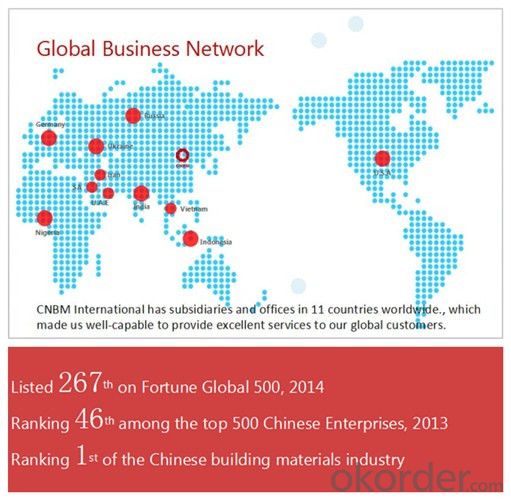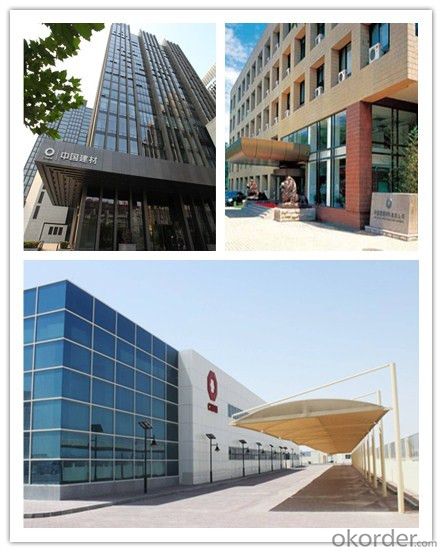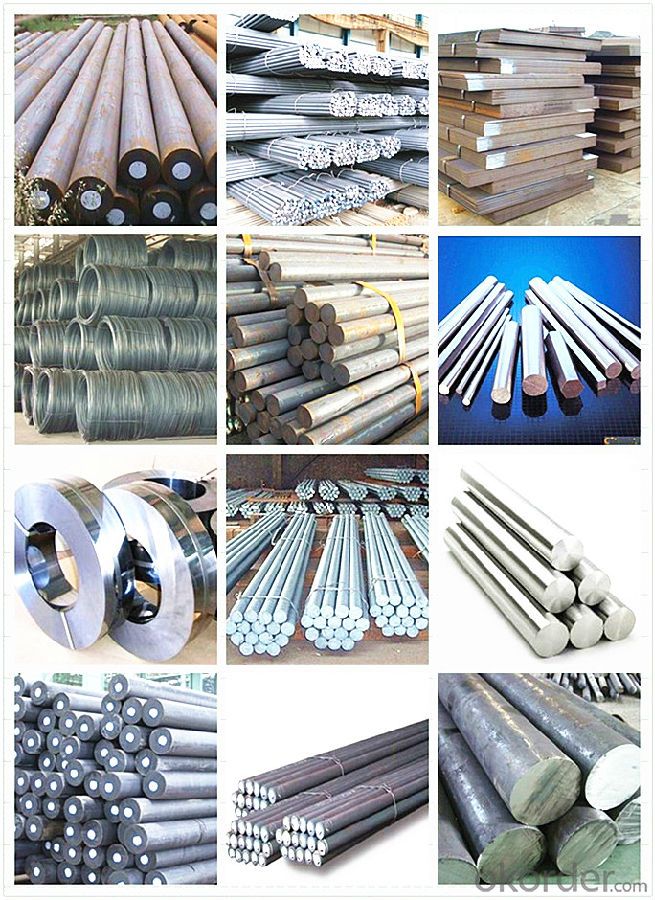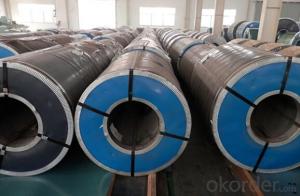Grade EN10346-DX53D+Z Galvanized Steel Coil
- Loading Port:
- Tianjin
- Payment Terms:
- TT OR LC
- Min Order Qty:
- 3 m.t.
- Supply Capability:
- 10000 m.t./month
OKorder Service Pledge
OKorder Financial Service
You Might Also Like
Item specifice
Grade Grade EN10346-DX53D+Z Galvanized Steel Coil
Specification of Grade Grade EN10346-DX53D+Z Galvanized Steel Coil
1. Galvanized Steel Coil
(1) Width: 600-1570mm
(2) Thickness: 0.13-5.0mm
(3) Grade: JIS G3302-SGCC-SGC570, SGCH (full hard-G550), SGHC-SGH540
EN10346-DX51D+Z, DX53D+Z, S250GD-S550GD
STM A653-CS-B, SS255-SS550
(4) Zinc Coating: Z40g/m2~Z500g/m2 (both side total coating thickness)
2. Galvalume Steel Coil
(1) Width: 600~1500mm
(2) Thickness: 0.15~2.30mm
(3) Grade: JIS G3321-SGLCC, SGLC400-570, (G550)
EN10346-DX51D+AZ, DX53D+AZ, S250-S550
ASTM A792M CS-B, SS255-SS550
(4) AZ Coating: AZ50~AZ185g/m2
3. Prepainted Galvanized Steel Coil (PPGI)
(1) Width: 600~1250mm
(2) Thickness: 0.19~1.50mm
(3) Grade: JIS G3312-CGCC, CGC340-570, (G550)
ASTM A755M CS-B, SS255-SS550
(4) Zinc Coating: Z40g/m2~Z500g/m2 (both side total coating thickness)
4. Prepainted Galvanized Steel Coil (PPGL)
(1) Width: 600~1250mm
(2) Thickness: 0.20~1.50mm
(3) Grade: JIS G3322-CGLCC, CGLC340-570, (G550)
ASTM A755M CS-B, SS255-SS550
(4) AZ Coating: AZ50~AZ185g/m2 (both side total coating thickness)
5. Cold Rolled Steel Coil (Soft) (for further information, pls click the product name)
(1) Width: 600~1570mm
(2) Thickness: 0.13~2.50mm
(3) Grade: JIS G3141-SPCC-SD, SPCD-SD, SPEC-SD
JIS G3135-SPFC 340/390/440
EN10130-DC01, DC03, DC04
SAE1006, SAE1008
ASTM A424-TypeⅡ
6. Cold Rolled Steel Coil (Full Hard) (for further information, pls click the product name)
(1) Width: 600~1570mm
(2) Thickness: 0.13~2.50mm
(3) Grade: JIS G3141-SPCC-1B, SPCC-1D
7. Hot Rolled Steel Coil
(1) Width: 1000~1524mm
(2) Thickness: 1.20~16.5mm, other thickness can be negotiation
(3) Grade: JIS G3101-SS400, JIS G3132-SPHT1/2/3, ASTM A36, Q195, Q235 etc.
Company Introduction of the Grade EN10346-DX53D+Z Galvanized Steel Coil
CNBM International Corporation is the most import and export platform of CNBM group(China National Building Material Group Corporation) ,which is a state-owned enterprise, ranked in 270th of Fortune Global 500 in 2015.
With its advantages, CNBM International are mainly concentrate on Cement, Glass, Iron and Steel, Ceramics industries and devotes herself for supplying high quality series of refractories as well as technical consultancies and logistics solution.


Packaging & Delivery of the Grade EN10346-DX53D+Z Galvanized Steel Coil
Packaging Detail | Sea worthy packing /as per customer's packing instruction |
Delivery Detail | 15 ~ 40 days after receiving the deposit |
Products Show:

FAQ:
Are you a trading company or manufacturer? | Manufacturer |
What’s the MOQ? | 3 metric ton |
What’s your delivery time? | 15-35 days after downpayment received |
Do you Accept OEM service? | Yes |
what’s your delivery terms? | FOB/CFR/CIF |
What's the Payment Terms? | 30% as deposit,70% before shipment by T/T |
Western Union acceptable for small amount. | |
L/C acceptable for large amount. | |
Scrow ,Paybal,Alipay are also ok | |
Why choose us? | Chose happens because of quality, then price, We can give you both. Additionally, we can also offer professional products inquiry, products knowledge train (for agents), smooth goods delivery, excellent customer solution proposals. |
What's your available port of Shipment? | Main Port, China |
What’s your featured services? | Our service formula: good quality+ good price+ good service=customer's trust
|
Where are your Market? | Covering more than 160 countries in the world |
- Q:What are the future trends and innovations expected in special steel production?
- The special steel production industry is anticipated to undergo significant changes in the future. Several trends and innovations will shape this industry, and the following key areas are expected to see advancements: 1. Advanced Manufacturing Techniques: Special steel manufacturers will likely adopt advanced manufacturing techniques, such as additive manufacturing (3D printing) and digitalization. These technologies will facilitate the production of complex geometries, minimize waste, and allow for customization of special steel products. 2. Sustainable Production: Due to growing environmental concerns, there will be a focus on sustainable production methods in the special steel industry. This will involve adopting energy-efficient processes, recycling and reusing materials, and reducing the carbon footprint of steel production. 3. High-Strength and Lightweight Alloys: The demand for lightweight materials in sectors like automotive and aerospace will drive special steel production towards developing high-strength and lightweight alloys. These alloys will enhance performance while reducing component weight, leading to improved fuel efficiency and sustainability. 4. Nanotechnology and Microstructural Engineering: Nanotechnology and microstructural engineering will enhance the properties of special steels. By manipulating materials at the nanoscale, manufacturers can improve strength, toughness, corrosion resistance, and other characteristics. 5. Enhanced Surface Treatments: Advancements in surface treatments, such as coatings, will improve the performance and longevity of special steel products. Innovative surface treatments will offer increased resistance to wear, corrosion, and heat, expanding the range of applications for special steels. 6. Digitalization and Data Analytics: Special steel production will undergo a revolution with the integration of digital technologies and data analytics. Smart factories with interconnected systems will enable real-time monitoring, predictive maintenance, and improved quality control, resulting in higher productivity and efficiency. 7. Automation and Robotics: Automation and robotics will continue to play a vital role in special steel production, optimizing productivity, reducing human errors, and improving worker safety. This will enhance overall operational efficiency. 8. Industry 4.0 Integration: The special steel industry will embrace Industry 4.0 principles, including the Internet of Things (IoT) and artificial intelligence (AI). These technologies will enable seamless connectivity, intelligent decision-making, and predictive analysis, leading to improved productivity, cost-effectiveness, and competitiveness. In conclusion, the future of special steel production will be shaped by advancements in manufacturing techniques, sustainable practices, material engineering, digitalization, and automation. These innovations will not only enhance the performance and quality of special steel products but also contribute to a more sustainable and efficient industry.
- Q:How does special steel contribute to the chemical processing aftermarket industry?
- The chemical processing aftermarket industry heavily relies on special steel, which offers a wide range of benefits to enhance the efficiency and performance of equipment. Firstly, special steel is well-known for its exceptional strength and durability, making it ideal for applications involving high pressure, extreme temperatures, and corrosive environments. This durability ensures that the equipment can withstand challenging conditions and operate reliably for extended periods, reducing the need for frequent maintenance and replacement. Furthermore, special steel possesses excellent resistance to corrosion, oxidation, and chemical reactions, which are common challenges in the chemical processing industry. This resistance allows the equipment to handle various chemicals without deteriorating or contaminating the process, ensuring the quality and safety of the end products. Additionally, special steel can withstand the formation of scale, deposits, and other contaminants that can hinder equipment efficiency, reducing the frequency of cleaning and maintenance. Moreover, special steel offers superior mechanical properties such as toughness, hardness, and impact resistance, which are essential for handling heavy loads and abrasive materials. This ensures that the equipment can withstand demanding operational conditions and maintain its performance over time, resulting in enhanced productivity and reduced downtime. Another significant contribution of special steel to the chemical processing aftermarket industry is its versatility. It can be customized and tailored to meet specific requirements, allowing for the manufacturing of complex parts and components essential for various chemical processes. Special steel can be fabricated into different shapes and sizes, enabling the creation of intricate designs and structures that optimize equipment efficiency and effectiveness. In conclusion, special steel is vital to the chemical processing aftermarket industry due to its exceptional strength, durability, resistance to corrosion and chemical reactions, as well as its versatility. By providing reliable and high-performance equipment, special steel significantly contributes to the overall efficiency, safety, and productivity of chemical processing operations.
- Q:Can special steel be used for medical implants?
- Yes, special steel can be used for medical implants. Certain types of stainless steel, such as 316L, are commonly utilized in the manufacturing of medical implants due to their excellent biocompatibility, corrosion resistance, and mechanical properties.
- Q:How does special steel contribute to the telecommunications machinery industry?
- Special steel plays a crucial role in the telecommunications machinery industry by providing the necessary materials for the production of high-quality and durable equipment. Telecommunications machinery, such as antennas, satellite dishes, and transmission towers, are exposed to various environmental conditions and need to withstand extreme weather, corrosion, and mechanical stress. Special steel, known for its exceptional strength, toughness, and resistance to corrosion, provides the necessary properties to ensure the longevity and reliability of telecommunications equipment. For instance, antennas and satellite dishes made from special steel can withstand strong winds and harsh weather conditions without compromising signal quality or structural integrity. Moreover, special steel is used in the production of transmission towers, which are vital for the efficient transmission of signals across long distances. These towers need to support heavy equipment, withstand dynamic loads, and resist corrosion to maintain uninterrupted communication. Special steel, with its high tensile strength and corrosion resistance, ensures the stability and longevity of transmission towers, contributing to the overall reliability of the telecommunications network. Additionally, special steel is utilized in the manufacturing of cables and connectors used in telecommunications systems. These components require high conductivity, low resistance, and resistance to wear and tear. By using special steel, telecommunications machinery manufacturers can ensure efficient signal transmission and reduce signal loss, leading to improved communication quality. In summary, special steel is essential to the telecommunications machinery industry as it provides the necessary materials with superior strength, durability, and resistance to corrosion. By using special steel in the production of antennas, satellite dishes, transmission towers, cables, and connectors, the industry can deliver reliable and high-quality telecommunications equipment to meet the growing demands of the modern world.
- Q:What are the specific requirements for special steel used in the nuclear waste storage industry?
- The specific requirements for special steel used in the nuclear waste storage industry include high corrosion resistance to withstand the harsh and corrosive environment of nuclear waste, excellent mechanical properties to maintain structural integrity over long periods of time, low susceptibility to radiation-induced embrittlement, and the ability to retain its properties even at elevated temperatures. Additionally, the steel must meet stringent standards for radiation shielding and must be able to prevent the release of radioactive materials into the environment.
- Q:What are the different international trade regulations for special steel?
- There are several international trade regulations that apply to special steel, which is a type of steel that is produced for specific applications or industries. These regulations aim to ensure fair trade practices, protect domestic industries, and promote safety standards. One of the primary international trade regulations for special steel is the World Trade Organization (WTO) agreements. The WTO sets rules for global trade, including the General Agreement on Tariffs and Trade (GATT) and the Agreement on Safeguards. These agreements govern issues such as tariffs, non-tariff barriers, and safeguard measures that may be imposed on special steel imports. Another significant regulation is the Harmonized System (HS) codes. HS codes are a standardized system of names and numbers used to classify traded products. Special steel is assigned specific HS codes, which help customs authorities determine the applicable duties and regulations for these products during import or export. Additionally, regional trade agreements (RTAs) play a role in regulating international trade in special steel. RTAs are agreements between countries or regions that reduce trade barriers and promote economic integration. Examples include the North American Free Trade Agreement (NAFTA), the European Union (EU), and the Comprehensive and Progressive Agreement for Trans-Pacific Partnership (CPTPP). These agreements may include provisions related to tariffs, technical standards, and trade facilitation for special steel. Furthermore, some countries may impose specific regulations on the import or export of special steel. These regulations could include licensing requirements, quality standards, safety certifications, or restrictions on certain types of steel. It is essential for businesses involved in the trade of special steel to be aware of these country-specific regulations to ensure compliance. Overall, international trade regulations for special steel encompass a range of agreements, codes, and country-specific rules. Adhering to these regulations is crucial for companies engaged in the global trade of special steel to ensure compliance, avoid penalties, and maintain fair trade practices.
- Q:What are the requirements for special steel used in aircraft manufacturing?
- The requirements for special steel used in aircraft manufacturing are quite stringent due to the critical nature of the components and the demanding operating conditions in which they are subjected. Here are some key requirements: 1. High strength: Special steel used in aircraft manufacturing must possess exceptional strength to withstand the extreme forces and loads experienced during flight. This ensures the structural integrity and safety of the aircraft. 2. Lightweight: While strength is crucial, special steel for aircraft must also be lightweight to minimize the overall weight of the aircraft. This helps enhance fuel efficiency and allows for increased payload capacity. 3. Corrosion resistance: The steel must exhibit excellent resistance to corrosion, as aircraft are often exposed to harsh environments, including high humidity, saltwater, and various chemicals. Corrosion resistance helps maintain the structural integrity and prolong the lifespan of the aircraft. 4. Fatigue resistance: Special steel must have high fatigue resistance to withstand repetitive loading and unloading cycles that occur during flight. This ensures that the components do not fail prematurely due to cyclic stress. 5. Heat resistance: The steel should be able to withstand high temperatures generated by the engines, as well as the heat generated during high-speed flight. Heat resistance prevents deformation, melting, or loss of strength under extreme thermal conditions. 6. Weldability: Special steel used in aircraft manufacturing should possess good weldability, allowing for efficient and reliable joining of components during the manufacturing process. This ensures strong and secure connections between various parts of the aircraft. 7. Non-magnetic properties: In certain applications, such as electronic systems, it is essential for the steel to be non-magnetic to prevent interference with sensitive equipment. 8. Traceability and certification: The steel must have proper traceability and certification to meet industry standards and regulatory requirements. This includes documentation of the steel's composition, manufacturing process, and testing procedures to ensure consistent quality and performance. Meeting these requirements is essential to ensure the safety, reliability, and efficiency of aircraft. Special steel used in aircraft manufacturing undergoes rigorous testing, quality control, and certification processes to ensure it meets these stringent requirements before being used in the construction of aircraft components.
- Q:How is special steel made?
- Special steel is made through a process called alloying, where different elements are added to iron to enhance its properties such as strength, durability, and resistance to corrosion. This alloying process can include elements like chromium, nickel, vanadium, and manganese, among others. The exact composition and manufacturing process can vary depending on the desired characteristics and application of the special steel being produced.
- Q:How is special steel used in the oil and gas industry?
- Special steel is used extensively in the oil and gas industry due to its unique properties and high strength. It is specifically designed to withstand harsh environments, corrosion, and extreme temperatures. Special steel is used in various applications such as drilling equipment, pipelines, storage tanks, and valves, ensuring reliability and safety in the extraction, transportation, and processing of oil and gas.
- Q:Can special steel be used in the telecommunications industry?
- Yes, special steel can be used in the telecommunications industry. It is often used in the construction of telecommunication towers, antennas, and transmission lines due to its high strength, corrosion resistance, and durability.
1. Manufacturer Overview |
|
|---|---|
| Location | |
| Year Established | |
| Annual Output Value | |
| Main Markets | |
| Company Certifications | |
2. Manufacturer Certificates |
|
|---|---|
| a) Certification Name | |
| Range | |
| Reference | |
| Validity Period | |
3. Manufacturer Capability |
|
|---|---|
| a)Trade Capacity | |
| Nearest Port | |
| Export Percentage | |
| No.of Employees in Trade Department | |
| Language Spoken: | |
| b)Factory Information | |
| Factory Size: | |
| No. of Production Lines | |
| Contract Manufacturing | |
| Product Price Range | |
Send your message to us
Grade EN10346-DX53D+Z Galvanized Steel Coil
- Loading Port:
- Tianjin
- Payment Terms:
- TT OR LC
- Min Order Qty:
- 3 m.t.
- Supply Capability:
- 10000 m.t./month
OKorder Service Pledge
OKorder Financial Service
Similar products
New products
Hot products
Related keywords

































